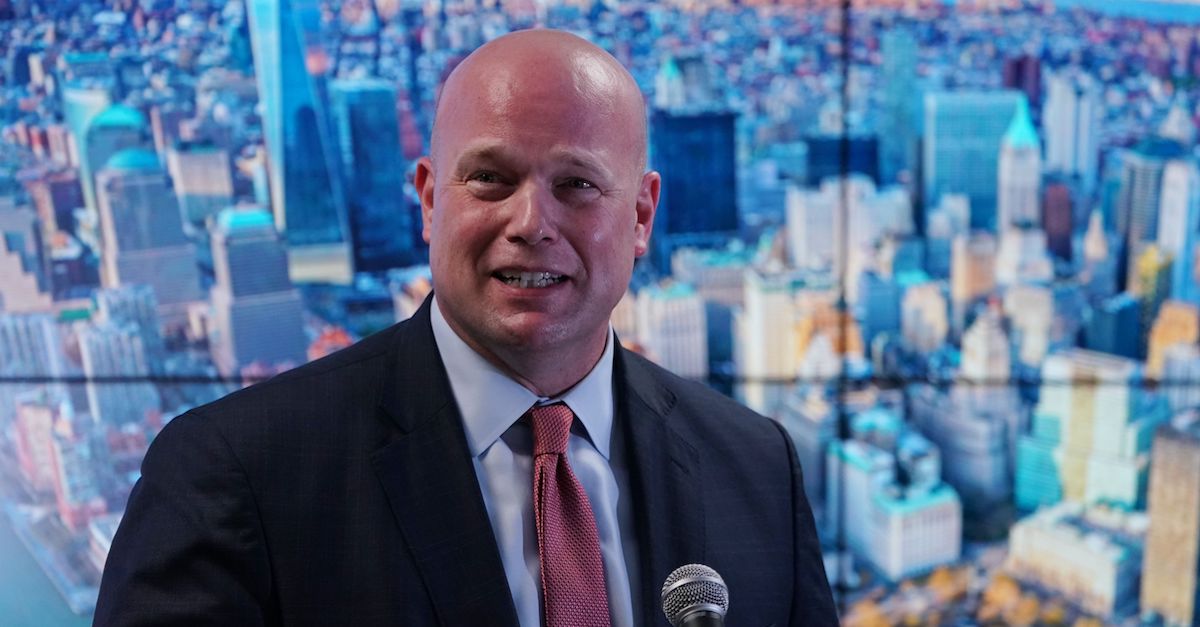
Several legal scholars have submitted an amicus brief in the United States District Court for the District of Maryland challenging the appointment of Matthew Whitaker as acting Attorney General of the United States.
The amici curiae (which means friends of the court) submitted this brief in the context of Maryland Attorney General Brian E. Frosh‘s (D) challenge of the Whitaker appointment. Frosh has argued that Deputy Attorney General Rod Rosenstein should have replaced Jeff Sessions as Attorney General, not Whitaker, and has called the move “illegal and unconstitutional.”
The amici curiae have been named as University of California, Berkeley, School of Law Dean and Prof. Erwin Chemerinsky, UCLA School of Law Prof. Jon D. Michaels, George Washington University Law School Associate Dean for Public Interest and Public Service Law Alan B. Morrison, Georgetown University Law Center Prof. Victoria Nourse, Ohio State University Moritz College of Law’s Chair Peter M. Shane, Fordham University School of Law Prof. Jed H. Shugerman, and Harvard Law School Prof. Laurence H. Tribe.
They argue in the 21-page brief that President Donald Trump violated the Appointments Clause of the Constitution by appointing Whitaker to his post without the advice and consent of the U.S. Senate (i.e., that Whitaker was not confirmed by Congress).
“Amici submit this brief to provide the Court their perspective on what the Appointments Clause requires and why the constitutional implications of the appointment of acting Attorney General Matthew Whitaker are so troubling,” they said. [T]he President baldly bypassed the advice and consent of the Senate to unilaterally install a government employee, whose name had never been sent to the Senate, let alone approved by it, to a principal constitutional office.”
They maintain that, “[e]ver since the Attorney General first became the head of the Department of Justice in 1870, the order of succession to act as Attorney General in the event of a vacancy has been specifically provided by statute; and the statute directs the Deputy Attorney General—who has been confirmed by the Senate in part as a constitutional understudy—to fill the office.”
“We are not aware of even a single previous instance when any president has appointed an acting Attorney General to lead the Department of Justice from a role that did not require Senate confirmation,” they said, adding that even though Whitaker is a temporarily filling this role he is still a “principal officer” as defined by the Constitution.
Not long after this brief was filed, 15 state attorneys general have also filed an amicus brief in Maryland. They are the attorneys general of the District of Columbia, Pennsylvania, Connecticut, Delaware, Hawaii, Illinois, Maine, Massachusetts, New Mexico, New York, North Carolina, Oregon, Rhode Island, Virginia, and Washington.
https://twitter.com/NewYorkStateAG/status/1067185855020830721
“The law is clear – and Matthew Whitaker’s appointment as Acting Attorney General is illegal, violating long-standing rules,” New York Attorney General Barbara Underwood said in a statement. “Our coalition of Attorneys General will continue to do what’s necessary to protect the rule of law.”
As Law&Crime has reported before, the debate about the Whitaker appointment has focused on whether he is considered a “principal” or “inferior” officer.
While the Department of Justice’s Office of Legal Counsel (OLC) opined that Whitaker’s appointment “accords with the plain terms of the Vacancies Reform Act of 1998” and is “consistent with the Appointments Clause of the Constitution,” opponents of the move have argued that Whitaker’s appointment was illegal.
Indeed, critics such as Kellyanne Conway‘s attorney husband George Conway and former Acting Solicitor General of the United States Neal Katyal penned an op-ed in the New York Times, arguing that exact opposite of what the OLC said.
“President Trump’s installation of Matthew Whitaker as acting attorney general of the United States after forcing the resignation of Jeff Sessions is unconstitutional,” they argued. “It’s illegal. And it means that anything Mr. Whitaker does, or tries to do, in that position is invalid.”
The OLC, on the other hand, said that Whitaker, as acting Attorney General, isn’t a principal officer and therefore the Appointments Clause wasn’t violated.
“We also advised that Mr. Whitaker’s designation would be consistent with the Appointments Clause of the U.S. Constitution, which requires the President to obtain the ‘Advice and Consent of the Senate,’ before appointing a principal officer of the United States,” the OLC said. “Although an Attorney General is a principal officer requiring Senate confirmation, someone who temporarily performs his duties is not.”
“As all three branches of government have long recognized, the President may designate an acting official to perform the duties of a vacant principal office, including a Cabinet office, even when the acting official has not been confirmed by the Senate,” the OLC concluded. “[I]t does not matter whether an acting official temporarily filing a vacant principal office is an inferior officer or not an ‘officer’ at all within the meaning of the Constitution.”
The aforementioned legal scholars called the “implication” of that quote “bizarre.”
“Whitaker heads the Department of Justice with the full authority of the Attorney General and is obviously an officer,” they said. “Such power cannot be wielded by a mere employee, and the acting Attorney General is therefore clearly a constitutional officer.”
Legal scholars’ argument against Whitaker by Law&Crime on Scribd
Editor’s note: this article has been updated to reflect that 15 state attorneys general have filed an amicus brief of their own.
[Image via Don Emmert/AFP/Getty Images]